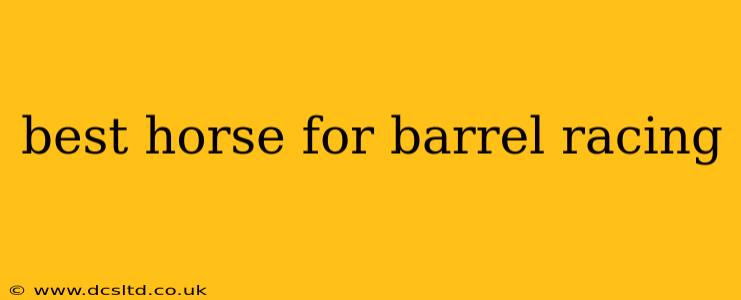Barrel racing demands a unique blend of athleticism, agility, and temperament in a horse. There's no single "best" breed, but rather a set of ideal characteristics that make certain breeds and bloodlines particularly well-suited for this fast-paced rodeo event. This guide delves into the key traits, breed considerations, and training aspects to help you find the perfect barrel racing partner.
What Makes a Great Barrel Racing Horse?
A top-tier barrel racing horse possesses a combination of physical attributes and mental fortitude. Crucially, it's not just about speed; it's about controlled speed, agility, and responsiveness. Here are some key characteristics:
-
Athleticism and Build: A compact, muscular build is essential. Horses should be quick to accelerate, possess explosive power for quick turns, and have the stamina to maintain speed throughout the entire run. Shorter, stockier horses often excel due to their lower center of gravity, aiding in stability during sharp turns.
-
Agility and Quickness: The ability to make tight, precise turns at high speed is paramount. Horses must have exceptional flexibility in their joints and a natural aptitude for quick changes in direction. Look for horses with a natural "turn and run" ability.
-
Responsiveness and Trainability: A horse that responds readily to cues from the rider is crucial for success. A quick reaction time and the ability to learn and retain commands are essential for executing the intricate maneuvers of barrel racing. A calm, willing attitude during training is also invaluable.
-
Mental Fortitude and Stamina: Barrel racing is physically and mentally demanding. A horse needs not only the physical stamina to complete the run but also the mental toughness to handle the pressure of competition, loud crowds, and the adrenaline of the race.
What Breeds Are Best for Barrel Racing?
While any horse with the right characteristics can be trained for barrel racing, certain breeds have proven themselves particularly successful:
-
Quarter Horses: This breed's inherent athleticism, compact build, and quickness make them a popular choice. Many champion barrel racers ride Quarter Horses, and their lineage is often heavily focused on barrel racing bloodlines.
-
American Paint Horses: Often possessing the same desirable qualities as Quarter Horses, Paint Horses add a splash of color and often display exceptional agility and stamina.
-
Appaloosas: Known for their stamina and athleticism, Appaloosas are another breed that frequently excels in barrel racing.
-
Thoroughbreds: While typically taller and leaner than Quarter Horses, Thoroughbreds can be incredibly fast and agile. Their speed can be a significant advantage, but they may require more refined training due to their higher energy levels.
H2: What are the most common injuries in barrel racing horses?
Injuries in barrel racing are a serious concern. The high-speed turns and sudden changes in direction put significant stress on a horse's joints and muscles. Common injuries include:
-
Leg injuries: These are the most frequent, often involving strains, sprains, and even fractures in the legs, particularly the knees and ankles.
-
Back injuries: The repetitive stress of turning and acceleration can lead to back problems, including muscle strains and sacroiliac issues.
-
Shoulder injuries: Similar to back injuries, shoulder issues can arise from the intense strain placed on the shoulders during turns.
Prevention of injuries is paramount. This involves proper training, conditioning, appropriate farrier care, and veterinary checkups.
H2: How much does a good barrel racing horse cost?
The cost of a good barrel racing horse varies significantly depending on the horse's age, training level, lineage, and performance record. A well-trained, proven barrel racing horse can cost tens of thousands of dollars. A younger horse with potential but requiring further training will typically cost less. It's crucial to thoroughly assess the horse's soundness and potential before making a significant investment.
H2: What is the best age to start training a horse for barrel racing?
Ideally, a horse should be sufficiently mature before intense barrel racing training begins. Many trainers recommend starting serious training around the age of three or four, allowing time for proper physical development. However, early groundwork and basic training can begin earlier to build a strong foundation.
Conclusion
Choosing the right barrel racing horse is a crucial step towards success. By understanding the ideal characteristics, considering various breeds, and prioritizing proper training and care, you can significantly increase your chances of finding a partner that will help you reach your goals in this exciting and challenging sport. Remember, the best horse is one that fits your riding style, experience level, and budget.
